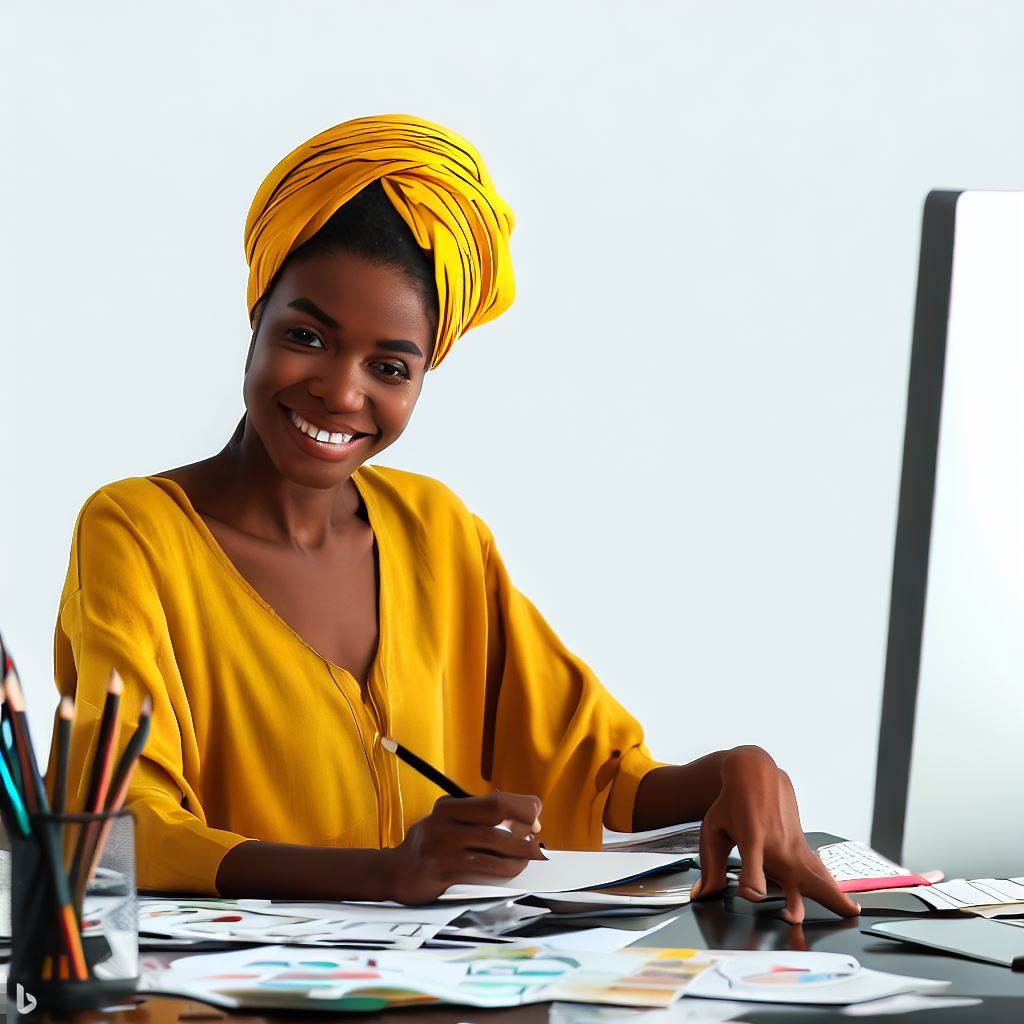Introduction
Gender equality, a concept of ensuring equal rights and opportunities for individuals regardless of their gender, has become a prominent global issue.
In the specific context of the illustrator profession in Nigeria, it is important to assess the level of gender equality and recognize the challenges that hinder its attainment.
The illustrator profession in Nigeria encompasses a diverse range of talents who create visual content for various purposes.
These professionals use their skills to convey messages, tell stories, and capture moments through images.
Whether it is designing book illustrations, creating animations, or developing graphic art for marketing campaigns, illustrators play a crucial role in the creative industry.
However, the level of gender equality within this profession in Nigeria is a topic that merits attention.
While the field offers opportunities for both men and women, it is necessary to analyze whether women face any barriers or discrimination that could limit their professional growth and achievements.
This blog post aims to delve into the illustrator profession in Nigeria and examine the existing challenges related to gender equality.
By shedding light on the experiences and perspectives of male and female illustrators, we can gain a better understanding of the current dynamics within the industry.
Ultimately, this analysis will contribute to the broader discussion on gender equality in the creative sector and serve as a foundation for further exploration and improvement.
Historical Perspective of Gender Equality in Nigeria
Brief overview of gender inequality in Nigeria’s history
- Gender inequality has been prevalent in Nigeria for centuries.
- Women have been marginalized and excluded from decision-making processes.
- Traditional norms and cultural practices have limited women’s opportunities and rights.
- Customary laws have prioritized male inheritance and property rights over women’s.
- Gender-based violence and discrimination against women have been widespread.
Evolution of women’s rights movements in Nigeria
- The women’s rights movement started gaining momentum in the 20th century.
- Women began demanding equal rights, access to education, and political participation.
- Activist organizations and women’s groups were formed to advocate for gender equality.
- The struggle for women’s rights gained significant traction during Nigeria’s independence movement.
- Women played crucial roles in various social and political movements, fighting for their rights.
Impact of gender inequality on professions, including illustration
- Gender inequality has hindered women’s participation and progress in various professions.
- In the illustrator profession, women have faced obstacles and discrimination in Nigeria.
- Limited opportunities and biases have restricted women from showcasing their artistic talents.
- Unequal access to resources, training, and mentorship has affected women’s professional growth.
- Gender stereotypes and societal expectations have discouraged women from pursuing illustration careers.
Basically, Nigeria’s history reflects deep-rooted gender inequality, which has negatively impacted women’s rights and professions.
The next sections will discuss the current state of gender equality in the illustrator profession in Nigeria.
Read: Training and Development Resources for Illustrators in Nigeria
Current Status of the Illustrator Profession in Nigeria
Statistics on the number of male and female illustrators
- Gender representation in the illustrator profession in Nigeria remains imbalanced.
- The majority of illustrators in Nigeria are male, with only a small percentage being female.
- According to recent statistics, male illustrators make up around 70% of the profession, while female illustrators constitute only 30%.
Prominent male illustrators in Nigeria and their successes
- Nigeria has a vibrant community of skilled male illustrators who have achieved significant success.
- Names like Chukwuemeka Nwoha, Ahmed Ismail, and Tolu Dickson are known for their exceptional work.
- These male illustrators have gained recognition for their talent both nationally and internationally.
- Their success stories inspire aspiring illustrators and contribute to the growth of the profession in Nigeria.
- They have received numerous awards, exhibited their artwork in prestigious galleries, and collaborated with renowned brands.
Challenges faced by female illustrators in terms of recognition, opportunities, and pay disparities
- Female illustrators in Nigeria often face significant challenges in gaining recognition for their talents.
- Traditional gender biases and stereotypes persist, leading to limited exposure and opportunities for female illustrators.
- Female illustrators struggle to secure prominent projects and collaborations compared to their male counterparts.
- Pay disparities also exist, with female illustrators being paid less for their work compared to male illustrators.
- The lack of representation and visibility for female illustrators perpetuates this cycle of inequality.
- Female illustrators are determined and talented, but they face an uphill battle in breaking through these barriers.
- However, many female illustrators in Nigeria are pushing boundaries, creating exceptional work, and demanding recognition.
- Organizations and platforms supporting female illustrators have emerged, providing spaces for them to showcase their talent.
- Through these initiatives, female illustrators are slowly overcoming challenges and carving a path towards gender equality.
- It is crucial for the industry and society as a whole to acknowledge and appreciate the contributions of female illustrators.
- By providing equal opportunities, recognition, and fair compensation, the illustrator profession in Nigeria can thrive with gender equality.
Generally, the current status of the illustrator profession in Nigeria reflects a gender imbalance with male illustrators dominating the field.
While male illustrators have achieved significant successes and recognition, female illustrators face various challenges in terms of recognition, opportunities, and pay disparities.
Despite these obstacles, female illustrators continue to produce outstanding work and demand recognition.
With increased support and equal opportunities, the illustrator profession in Nigeria can achieve the much-needed gender equality.
Read: Nigerian Illustrators’ Impact on Global Art and Design
Gender Bias in the Selection Process
How gender biases affect the selection of illustrators for projects
Gender biases have a significant impact on the selection process of illustrators for projects in Nigeria.
These biases result in the underrepresentation of female illustrators in the industry.
Female illustrators often face discrimination based on their gender, leading to unequal opportunities compared to their male counterparts.
Gender biases influence the perception of capabilities, with male illustrators being perceived as more suitable for certain projects.
This bias hinders the progress of gender equality and limits the diversity of perspectives in the illustrator profession.
Organizations and clients should actively work towards eliminating gender biases in the selection process to promote equal opportunities.
Industry standards and requirements
The examination of industry standards and requirements reveals potential gender biases in the selection process of illustrators.
Oftentimes, these standards may favor certain styles or subjects that align with traditional gender roles.
By challenging these standards and encouraging a broader range of artistic expressions, gender biases can be overcome.
Inclusive industry standards can ensure a level playing field for all illustrators, regardless of their gender.
Organizations and industry bodies must review and revise standards to promote gender equality in the illustrator profession.
Case studies or interviews of female illustrators sharing their experiences with gender bias
Case studies and interviews of female illustrators provide valuable insights into the prevalence of gender bias in the selection process.
These accounts highlight the challenges faced, such as being overlooked for projects or receiving lower compensation compared to male colleagues.
Female illustrators often share stories of having to prove themselves repeatedly, while male illustrators receive more trust and recognition.
These experiences serve as evidence of the urgent need to address and eliminate gender bias in the illustrator profession.
By amplifying the voices of female illustrators, awareness can be raised and actions can be taken to rectify gender biases in the selection process.
Read: Ethics in the Illustrator Profession: A Nigeria Perspective

Societal and Cultural Constraints
Analysis of societal and cultural factors that contribute to gender inequality in the illustrator profession
In Nigeria, gender inequality in the illustrator profession can be attributed to various societal and cultural factors.
- Patriarchal norms and values prevailing in Nigerian society perpetuate the notion that art and illustration are male-dominated fields.
- Stereotypical beliefs regarding women’s roles in society hinder their access to opportunities and resources in the illustration profession.
- Limited access to education and training for women in rural areas further exacerbates gender inequality in the illustrator profession.
- Traditional beliefs that prioritize marriage and motherhood over pursuing a career impact women’s involvement in the field.
Traditional gender roles and expectations
In Nigeria, traditional gender roles and expectations play a significant role in perpetuating gender inequality within the illustrator profession.
- Women are often expected to prioritize family responsibilities, which leaves little time and flexibility for pursuing a career in illustration.
- Men are often encouraged to take up more “prestigious” careers, while creative fields like illustration are deemed less lucrative and suitable for women.
- Gender stereotypes dictate that women should focus on nurturing and caregiving roles, steering them away from pursuing careers in the arts.
- Traditional gender roles also discourage women from seeking leadership positions within the illustrator profession, limiting their growth and influence.
Societal pressure and the impact on female illustrators in Nigeria
Societal pressure plays a significant role in creating barriers for female illustrators in Nigeria, impacting their professional growth and success.
- Expectations to conform to societal norms often lead female illustrators to face a higher degree of scrutiny and criticism compared to their male counterparts.
- Women illustrators may encounter biases and discrimination in terms of project assignments, pay disparities, and opportunities for career advancement.
- Social stigmatization and lack of recognition for the achievements of female illustrators discourage young women from pursuing a career in the field.
- Societal pressure to prioritize marriage and motherhood over career aspirations further marginalizes women in the illustrator profession.
Essentially, gender inequality in the illustrator profession in Nigeria is influenced by societal and cultural constraints.
Patriarchal norms and traditional gender roles limit women’s access to opportunities and resources, perpetuating the notion of male dominance in the field.
Societal pressure and expectations place additional burdens on female illustrators, hindering their professional growth and success.
Addressing these constraints requires a multi-faceted approach, including promoting gender equality in education, challenging stereotypes, and providing support and recognition for female illustrators.
By dismantling these societal and cultural barriers, Nigeria can foster a more inclusive and equitable illustrator profession for all genders.
Read: Balancing Art and Business as an Illustrator in Nigeria
Initiatives Promoting Gender Equality in the Illustrator Profession
Overview of organizations or initiatives working towards gender equality in the profession
- Women Illustrators of Nigeria (WIN): WIN advocates for the rights and recognition of female illustrators in Nigeria.
- Gender Equality Illustrators Nigeria (GEIN): GEIN aims to eliminate gender disparities and empower female illustrators.
- Association of Female Illustrators Nigeria (AFIN): AFIN provides a platform for networking and mentorship among female illustrators.
Examples of successful efforts and impact on the industry
- Mentorship Programs: WIN and AFIN organize mentorship programs to inspire and guide aspiring female illustrators.
- Gender-Inclusive Exhibitions: GEIN hosts exhibitions that feature the work of both male and female illustrators, promoting equality in visibility and opportunities.
- Awards and Recognition: Initiatives like WIN and GEIN recognize outstanding female illustrators, boosting their confidence and career prospects.
Available resources and support for female illustrators in Nigeria
- Funding Opportunities: Organizations like GEIN provide grants and funding opportunities specifically tailored for female illustrators.
- Workshops and Training: AFIN conducts workshops on various illustration techniques to enhance the skills of female illustrators.
- Online Communities: Social media groups and forums provide a space for female illustrators to connect, share resources, and seek advice.
In general, organizations and initiatives in Nigeria are actively working towards achieving gender equality in the illustrator profession.
WIN, GEIN, and AFIN are notable organizations that advocate for the rights, recognition, and empowerment of female illustrators.
Mentorship programs, gender-inclusive exhibitions, and awards have had a significant impact in promoting gender equality and providing opportunities for female illustrators.
Additionally, funding opportunities, workshops, and online communities offer invaluable resources and support for their professional development.
With these initiatives in place, the illustrator profession in Nigeria is becoming more inclusive, diverse, and supportive of female artists.
Strategies for Overcoming Gender Inequality in the Illustrator Profession
Steps that individuals and organizations can take to promote gender equality
- Implement gender-neutral hiring practices to ensure equal representation of male and female illustrators.
- Offer mentorship programs that specifically target and support female illustrators.
- Provide equal access to professional development opportunities for male and female illustrators.
- Create a safe and inclusive work environment that fosters collaboration and supports diversity.
- Advocate for fair wages and equal compensation for male and female illustrators.
- Establish networks and partnerships to connect female illustrators with industry professionals and potential clients.
- Support and promote the work of female illustrators through exhibitions, publications, and online platforms.
- Encourage male illustrators to be allies in advocating for gender equality in the profession.
Encouraging equal opportunities and support for female illustrators
- Offer scholarships and grants specifically for female illustrators to pursue education and professional development.
- Create mentorship programs where established female illustrators can mentor and guide aspiring artists.
- Provide access to resources such as art supplies, studio space, and software for female illustrators.
- Establish partnerships with companies and organizations that are committed to promoting diversity and gender equality.
- Organize workshops and seminars to address the unique challenges faced by female illustrators in the profession.
- Promote female illustrators through social media campaigns and online platforms to increase their visibility.
- Advocate for policies that promote work-life balance, including flexible work hours and parental leave.
- Collaborate with educational institutions to provide mentorship programs and internship opportunities for female art students.
Promoting awareness and education to challenge gender stereotypes
- Organize panel discussions and conferences to raise awareness about gender inequality in the illustrator profession.
- Include gender equality and diversity topics in art and design curricula at schools and universities.
- Invite successful female illustrators to give talks and share their experiences to inspire aspiring artists.
- Create awareness campaigns that challenge gender stereotypes and highlight the contributions of female illustrators.
- Collaborate with media outlets to feature stories and interviews of successful female illustrators.
- Encourage male and female illustrators to collaborate and challenge gender norms through their artwork.
- Engage in partnerships and collaborations with organizations that share the same commitment to gender equality.
- Promote diversity and gender equality in industry publications and awards.
By implementing these strategies, individuals and organizations can contribute to a more inclusive and gender-equal illustrator profession in Nigeria.
It is essential to recognize the talent and potential of female illustrators and provide them with the support and opportunities they deserve.
Only through collective efforts can we break down the barriers and create a profession that embraces diversity and equal representation.
Conclusion
Recap of the main points discussed in the blog post
- Highlighted the challenges and discrimination faced by female illustrators in Nigeria.
- Explored the reasons behind the gender disparity in the field.
- Discussed the need for equal opportunities and recognition for all genders in the profession.
Reinforcement of the importance of gender equality in the illustrator profession in Nigeria
The illustrator profession in Nigeria can only thrive and reach its full potential when gender equality is embraced.
Striving for equal representation and eliminating gender bias will not only benefit individual illustrators but also contribute to the growth and diversity of the industry as a whole.
Call to action for individuals and the industry as a whole to work towards creating a more inclusive environment for all genders:
We must collectively take steps to address the gender disparity in the illustrator profession.
This includes creating mentorship programs, providing equal opportunities and recognition, promoting diverse voices, and challenging gender stereotypes.
By doing this, we can foster a more inclusive and equitable industry that empowers all illustrators, regardless of their gender.




